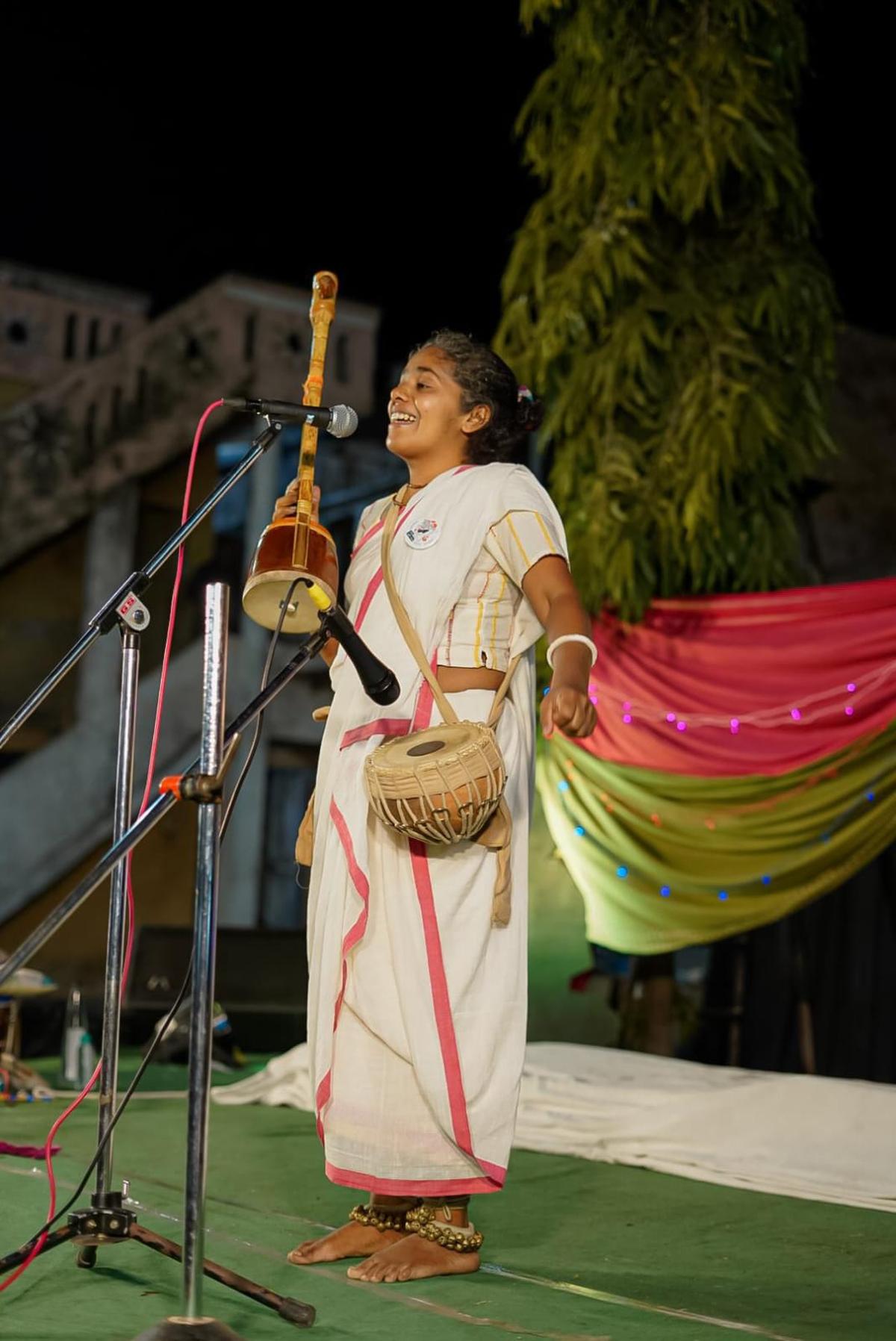Poozhiyil kalikkente kunje (play in the mud, child)…plavinte chuttum nee aadu kunje (dance around the jackfruit tree, child), plavu chirichal chakkapazham (if the tree smiles, you get jackfruit). As Santhipriya sings this song, there is a smile on the faces of the audience at the Sangeetha Nataka Akademi, the venue of the recently held International Theatre Festival of Kerala.
The song strikes an instant rapport with the audience, taking them back to their childhood days. She comes up with more songs about children and the environment. These have been taught to her by her father, theatre stalwart KJ Baby.
Santhipriya, the lone Baul singer from Kerala, draws inspiration from many traditions, but the one common thread is love and harmony. Santhi’s repertoire also includes the vachanas of Sree Narayana Guru, Kabir’s dohas, songs of Meera and the folk songs of Kerala. All these resonate with the spirit of Baul.
To be wounded by the sound — that’s how a young Santhi from Wayanad felt when she heard Baul music for the first time about two decades ago, as Baul singer Anusheh Anadil from Bangladesh sang away into the night in her open-throated voice at the University of Calicut.
Santhipriya with her guru, Parvathy Baul
Santhi had already heard stories of the Baul from her mother, Shirly Joseph, a revolutionary educationist and professor of English, and when she heard Anusheh sing the songs of Lalon Shah, it struck her that “this is what I want to do, how I want to sing”.
Santhi is a disciple of Parvathy Baul, and learnt the music in the traditional guru shishya parampara. Many years ago, when she approached Parvathy to teach her, she said she could not take any more students. But, Santhi persisted and travelled to Nedumangad, where Parvathy then lived with her husband Ravi Gopalan Nair.
Parvathy “Didi”, had a spontaneity that touched Santhi. “There is an inner joy she holds in whatever she does, be it cooking, drawing, playing with the dogs or teaching me songs. She would wake up in the middle of the night to draw. I am thankful I got to witness that as a young person.”
The unique motorbike-bullock cart rides to the villages of Bengal to meet Parvathy’s guru Sanatan Das, are still fresh in Santhi’s memory. “He used to be silent, but his presence was vibrant. She used to sing for him.” Santhi has also travelled with Parvathy to Baul festivals. “In some festivals, she would spontaneously ask me to sing with her; sometimes, while singing, she would ask me to dance with her. That is the core of Baul, to be in that flow.”

Santhipriya has travelled across villages of Bengal where Baul is a way of life
Nupur, ektara and duggi are the three instruments Santhi carries to her performances. These instruments have a meaning beyond offering a rich soundscape. “When you use three instruments, your attention is not on any of them, you come to an in-between field without thoughts. That’s the Baul ground, where one stands and sings.”
Being someone from outside the community comes with its test of spirit. “In each phase, one has to be honest, not act” says the artiste who has been moulded in the Krishnamurti school of thought as part of her studies in Sita school in Bengaluru.
Santhi grew up watching her father’s iconic plays such as Naatugaddika, the Kerala Sahitya Akademi-award winning work Mavelimantram, and Bespurkana that speaks of the exploitation of tribal communities. As a child, Santhi was a part of his collective singing troupes featuring tribal children.
Kanavu, the alternative school and commune for educating tribal children, which her parents co-founded in Wayanad, also influenced her. “All these made me who I am.”
When her father passed away, there was a video of Santhi singing before he was consigned to the flames. The wail of a song moved all. “Baul is a way to communicate with a vaster being. In this intimate conversation, there is no place for the beauty of the voice or perfection of technique. It is about singing with your heart. You do not sing to please or entertain, you sing to pray honestly. Baul music is about being who you really are on this earth,” says Santhi.
Published – March 19, 2025 03:13 pm IST
























